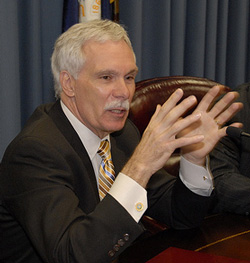 Working with funding from the U.S. Department of Transportation, the National Biodiesel Board (NBB) is granting $1.2 million to the Donald Danforth Plant Science Center in St. Louis, Mo. for a three-year project to enhance oil production from soybeans.
Working with funding from the U.S. Department of Transportation, the National Biodiesel Board (NBB) is granting $1.2 million to the Donald Danforth Plant Science Center in St. Louis, Mo. for a three-year project to enhance oil production from soybeans.
This NBB press release says it’s just another step the group has taken to free this country from foreign oil dependence:
 “This grant is yet another of the Danforth Center’s unique partnerships for supporting basic plant science research. In this case, the partnership will address the pressing needs for more efficient methods to produce fuels from renewable plant sources,” said Danforth Center President Dr. Roger N. Beachy. “We greatly appreciate the support of Senator Kit Bond and his staff in facilitating the relationship between the Danforth Center and the National Biodiesel Board in an effort to increase the oil feedstock for biodiesel production.”
“This grant is yet another of the Danforth Center’s unique partnerships for supporting basic plant science research. In this case, the partnership will address the pressing needs for more efficient methods to produce fuels from renewable plant sources,” said Danforth Center President Dr. Roger N. Beachy. “We greatly appreciate the support of Senator Kit Bond and his staff in facilitating the relationship between the Danforth Center and the National Biodiesel Board in an effort to increase the oil feedstock for biodiesel production.”
 “We are proud to support the Danforth Center as researchers there look for ways to get more bang for the buck from each soybean seed,” said NBB CEO Joe Jobe. “Increasing the oil feedstock supply is vital to the rapidly expanding biodiesel industry. Soybean oil is one of the primary feedstock sources used in the production of biodiesel, and we hope this research will increase the soy oil supply. Plus, whatever advances are made on beans will have a high likelihood of being transferred to other oilseed crops – other biodiesel sources.”
“We are proud to support the Danforth Center as researchers there look for ways to get more bang for the buck from each soybean seed,” said NBB CEO Joe Jobe. “Increasing the oil feedstock supply is vital to the rapidly expanding biodiesel industry. Soybean oil is one of the primary feedstock sources used in the production of biodiesel, and we hope this research will increase the soy oil supply. Plus, whatever advances are made on beans will have a high likelihood of being transferred to other oilseed crops – other biodiesel sources.”
Danforth Center Principal Investigator Dr. Jan Jaworski will lead the research project which will be focused on increasing the oil produced in soybean seeds by altering specific biochemical pathways that are embedded within the soybean plant. “We will undertake a new approach to enhancing the production of soy oil with a goal of increasing the percentage of oil produced in each seed,” Dr. Jaworski explained. “While this approach is new, we are confident our results will lead to increased oil production without reducing the amount of protein in the seeds: soy protein is an important source of food and feed.”



 Updated with recorded video
Updated with recorded video


 “The high price of gasoline is going to spur more investment in ethanol as an alternative to gasoline,” Bush said. “And the truth of the matter is it’s in our national interests that our farmers grow energy, as opposed to us purchasing energy from parts of the world that are unstable or may not like us.”
“The high price of gasoline is going to spur more investment in ethanol as an alternative to gasoline,” Bush said. “And the truth of the matter is it’s in our national interests that our farmers grow energy, as opposed to us purchasing energy from parts of the world that are unstable or may not like us.” Speaking to farm broadcasters meeting in Washington, Schafer said managing the blending of energy and agriculture is one of the top priorities for USDA. “If we over the next ten years could convert one-fourth of the four billion barrels of foreign oil that we import into this country into biofuels, not only would it increase the security of our country, it would double farm income,” said Schafer. “You can imagine if we doubled farm income in this country, what a revitalization would take place in rural areas.”
Speaking to farm broadcasters meeting in Washington, Schafer said managing the blending of energy and agriculture is one of the top priorities for USDA. “If we over the next ten years could convert one-fourth of the four billion barrels of foreign oil that we import into this country into biofuels, not only would it increase the security of our country, it would double farm income,” said Schafer. “You can imagine if we doubled farm income in this country, what a revitalization would take place in rural areas.”
 Seed giant Monsanto and Mendel Biotechnology are teaming up to develop a variety of grass seeds ideal for ethanol and biodiesel production.
Seed giant Monsanto and Mendel Biotechnology are teaming up to develop a variety of grass seeds ideal for ethanol and biodiesel production.